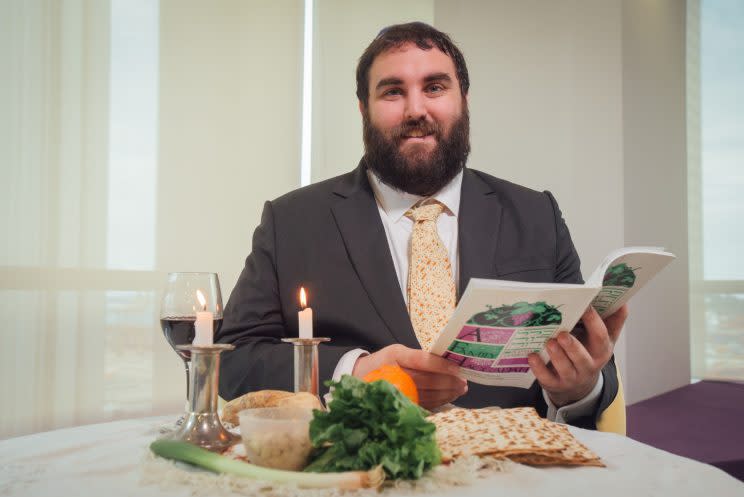Behind the belief: Why do Jews celebrate Passover?

How much do you know about the diversity of faiths in Singapore? In a new series, Yahoo Singapore explores the lesser-known rituals and branches of religions in the country.
In the Biblical book of Exodus, the story is told of the Israelites who were held in slavery in ancient Egypt. Hearing their cries of suffering, God inflicted 10 terrible plagues upon the Egyptians. This culminated with the Angel of Death striking down the first-born of the Egyptians, but passing over Israelite households and sparing them.
After the 10th and final plague, the Pharaoh of Egypt finally let the Israelites go. But they were then pursued by the Egyptians to the edge of the Red Sea, where God parted the waters to let the Israelites pass and begin their journey to the Promised Land, led by the prophet Moses.
Some 3,000 years after the events of Exodus, Jews all over the world are preparing to commemorate their deliverance from slavery with the spring festival of Passover. Starting Monday (10 April), they will commence a week of celebrations that begins with the Passover Seder meal. Held on the first and/or second night of Passover, the celebration follows a very specific order but is a lively, often raucous, event where the story of the Passover is retold over a family dinner laid out on fine china and silverware.
In Singapore, Rabbi Nathan Alfred will lead two Seder celebrations for some 250 people, while Jewish families here will also hold celebrations in their homes. Alfred, 36, is resident rabbi at the United Hebrew Congregation Singapore (UHC), which has some 600 members from about 20 countries. The UHC members adhere to Reform Judaism, a progressive branch of Judaism that counts about two million followers around the world.
Video by Nurul Amirah and Jeremy Ho
“It’s very important to re-tell the story to each new generation,” explained Alfred, who has been a rabbi for almost a decade and also served congregations in Belgium and Luxembourg. “At the Seder, there’s a lot of inter-generational story-telling. It’s the adults who are telling the children: this was you as well. You came out of Egypt just as we did, as your grandparents did and all your ancestors did, going all the way back to Moses.”
Each item on the Seder dinner plate has a special significance. For example, matzo, or unleavened flatbread, is served because the Israelites fled in such a hurry that they did not have time to wait for their bread dough to rise. The bread is dipped in salt water, which symbolises the tears of the Israelites. There is also charoset, a sweet paste made of fruits and nuts, which symbolises the mortar that the Israelites used to make bricks when they were enslaved.
Many Reform Jews also include an orange on the Seder plate as a symbol of inclusivity, said to be derived from the saying that a woman belongs on the bimah (an altar in the synagogue) as much as an orange belongs on the Seder plate.
The story of the Passover is told from the Haggadah, a text that sets forth the order of the Seder,by an an elder. The youngest at the table traditionally asks four all-important questions, beginning with: What makes this night different from other nights? According to Alfred, one tradition that has grown up with the Jewish community in Singapore is to ask the questions in as many different languages as possible, including Malay, Tamil and Mandarin. He told Yahoo Singapore, “If we get to asking the same four questions in 30 languages around one Seder table, then wow, this is a multilingual community.”

Asked about the spiritual significance of the Passover, Alfred responded, “It’s a reminder of when God really got involved in the Jewish story. God’s role in hearing a people who were suffering and were oppressed and who came and listened to their cries and brought them out of oppression. So it’s something that, when you’re in a difficult situation, you can remember that I’m not alone, that there is God who will hopefully listen to my cry and alleviate my situation.”
An empty seat is also left for the prophet Elijah, which harkens to the promise that the Messiah, or saviour, will come one day. “Elijah is said to go around the world and visit every Seder. He’s lucky that there are different time zones so he can have a bit more time to get around the world,” said Alfred with a smile.
For Stefanie Green, 49, Passover is a “wonderful family event” and a time to ponder the “actual Biblical implications” of the ritual. The business owner and mother of three, who is originally from Germany, is president of the UHC. She said, “Passover is a very emotional thing for Jews because it was such a momentous occasion. It’s a very powerful thing…you revisit and you remember, truly.”
UHC vice-president Claudia Kravetz, 37, added that Passover has a simple meaning for her. “For me, it means freedom. We were slaves in Egypt and although we wandered 40 years in the desert, we ended up being free.”
Asked if she feels wistful about being so far from home, Kravetz, a lawyer who hails from Chile, said, “Yeah, but at the same time, my family – which is spread not only in Latin America but also all over the world – I know we’re going to be celebrating the same thing at the same time, so we’re connected in spirit.”



